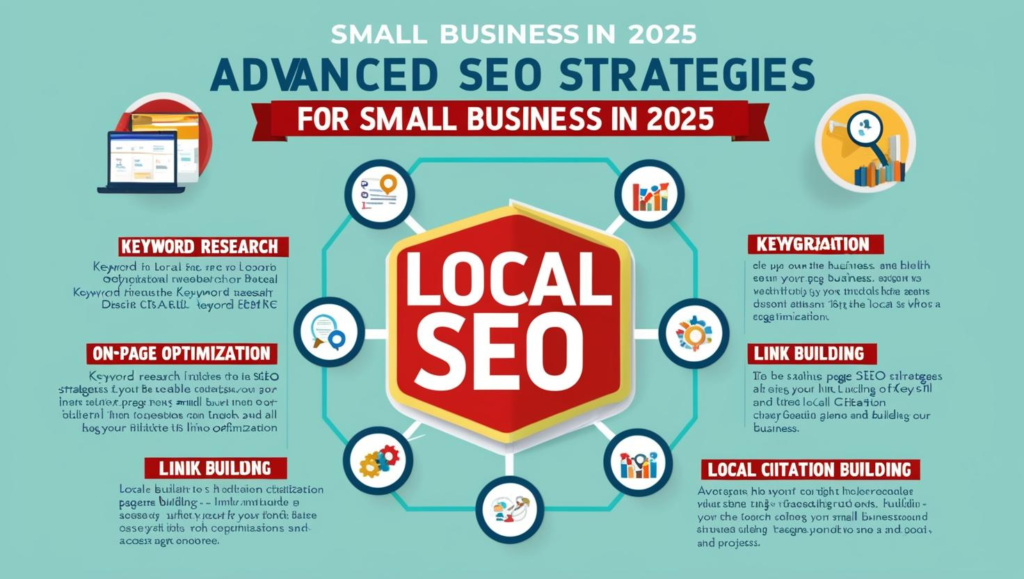If you run a small business, understanding local SEO strategies for small businesses 2025 is crucial to growing your presence and attracting local customers. Local SEO (Search Engine Optimization) involves optimizing your online presence to appear in relevant local search results. For instance, when users search for “pizza near me” or “best plumber in [your city]”, you want your business to rank high in the search results. This guide outlines practical steps to help small businesses implement effective local SEO strategies for small businesses 2025.

what is local Seo?
Local SEO refers to the process of improving your online visibility for geographically related searches. For example, “What is local SEO?” Local SEO is the process of optimizing a business’s online presence to attract customers in specific geographic areas.
Why Is Local SEO Important for Small Businesses?
Why should small businesses invest in local SEO? Local SEO strategies help businesses connect with local customers actively searching for services or products nearby. By implementing local SEO strategies for small businesses 2025, businesses can increase their foot traffic and online conversions significantly. For example, a bakery in Chicago saw a 40% increase in local orders after optimizing their online listings.
Step 1: How to Claim and Optimize Your Google Business Profile
Your Google Business Profile is essential for local SEO. Follow these steps to optimize your profile:
- Claim Your Business: Visit Google Business Profile to register your business.
- Provide Accurate Information: Ensure your name, address, phone number (NAP), and business hours are correct.
- Add Visuals: Use high-quality images of your products or storefront.
- Encourage Customer Reviews: Positive customer reviews enhance credibility and visibility.
Pro Tip: Keep your profile updated with posts about events, promotions, or new services.
Step 2: How to Conduct Local Keyword Research
Local keyword research is the foundation of effective local SEO. Tools like Google Keyword Planner and Ahrefs are invaluable.
Steps to Conduct Local Keyword Research:
- Identify Local Keywords: Focus on phrases like “[service] near me” or “[product] in [city]”.
- Analyze Competitors: Use tools to identify what terms local competitors rank for.
- Prioritize Search Intent: Choose keywords with high local intent, such as “best cafes in Boston.”
Step 3: Why Local Citations Matter
What are local citations? Local citations are online mentions of your business’s name, address, and phone number. Accurate citations boost your local rankings.
How to Build Local Citations:
- Register on platforms like Yelp and Yellow Pages.
- Use tools like Moz Local for citation management.
- Ensure consistency across all platforms.
Step 4: Website Optimization for Local SEO
Key Website Optimization Strategies:
- Use Local Keywords: Incorporate keywords like “plumbing services in Miami” in your content.
- Add Location Pages: Create separate pages for each service area.
- Embed Google Maps: Include a Google Map on your site.
Step 5: How to Collect and Manage Reviews
Why are online reviews important? Reviews build trust and influence rankings. For example, businesses with higher star ratings receive more clicks.
Tips for Managing Reviews:
- Request reviews from satisfied customers on Google.
- Respond to both positive and negative feedback promptly.
- Use tools to monitor online reviews across platforms
Conclusion
Investing in local SEO strategies for small businesses 2025 can transform your visibility and revenue. By focusing on these steps—optimizing your Google Business Profile, conducting targeted keyword research, building local citations, and encouraging reviews—you can ensure your business stands out in local search results. Start implementing these strategies today to see measurable improvements in your local search rankings.

Pingback: 2025 Guide: How To Update Old Content With AI Keywords For Better SEO - MarkNestHub